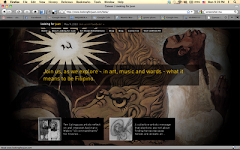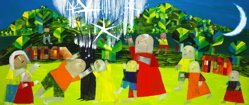=============================================
 Expressions of nationalism don’t have to be as grand or as life-changing as getting shot in Bagumbayan. Open your eyes a little wider and you’ll see love for country plastered on the humblest of garments: the T-shirt.
Expressions of nationalism don’t have to be as grand or as life-changing as getting shot in Bagumbayan. Open your eyes a little wider and you’ll see love for country plastered on the humblest of garments: the T-shirt.
After breaking free from the barong Tagalog and the terno, "nationalistic fashion" now speaks in the language of the youth. Hence, you have shirts bearing respectfully tweaked depictions of Filipino heroes — Jose Rizal in aviator sunglasses, anyone?; pithy slogans pregnant with Pinoy humor; and modified Philippine heraldry (since, according to Section 34 of Republic Act No. 8491, it is prohibited "to print, paint or attach representations of the flag on handkerchiefs, napkins, cushions, and other articles of merchandise").
Why is it cool to be Pinoy all of a sudden?
The popularity of these designs, which are aimed primarily at the so-called "Millennial Generation," or those born in the 1980s, and succeeding generational cohorts — is the culminating result of several socio-cultural factors.
Individuals born in the 1980s, although too young to participate in the 1986 People Power Revolution, were probably brought up by parents who participated in or, at the very least, remember the First Quarter Storm and the events leading up to the removal of the Marcos administration.
By the time EDSA Dos occurred in 2001, these Millennials were old enough to march to Ortigas Center to experience firsthand the exhilaration of a mass political movement.
Jay Aldeguer, president of Islands Souvenirs, a brand of geographical pride shirts that began in the 1990s, added that the advent of globalization and advances in technology ironically paved the way for an upsurge in patriotic sentiments. Confronted by a borderless world — virtual or otherwise — questions about Filipino identity cropped up again, in the same way that they did during momentous events in our history.
Then, too, came the diaspora of Filipino workers, whose prolonged periods away from native soil heightened their appreciation for all things Pinoy, no matter how small. "A lot of people are leaving the country. It’s a sad thing, but that’s what life is. When they do leave, they want to carry a sense of home with them," said My Philippines Lifestyle, Inc. president William Brian Dy, who observed that the "nationalistic" trend began with foreigners and balikbayans before trickling down to the local market.
Of course, international celebrities like boxer Manny Pacquiao and Internet sensations Charice Pempengco and Arnel Pineda have also made it "cool" to be Filipino. But long before these guys came onto the scene, there was rapper Francis Magalona, who made patriotic hits like "Man from Manila" and "Mga Kababayan," which were released in the 1990s. Upon his death, fans flocked to stores to snap up shirts from 3 Stars & a Sun, his clothing company, as a show of support.
The Philippines is sexy





Team Manila’s Aswang, Sanay sa Krisis, Psychedelic Rizal, Silog and I Rizal Ph T-shirts
Youth-oriented brands have adopted their own strategies of harnessing the buying power of this new generation of proud-to-be-Pinoy consumers.
"[They] have such a high-level of taste, expression and awareness. It’s up to us to ’get’ what kids of today are all about so that our shirts can give them an avenue to unleash their voice and be heard," said Team Manila general manager Nico Bacani.
In Team Manila’s case, a graphic design team and a product development team collaborate on designs that mine current issues for inspiration. The results are posted online and the public is asked to vote for their favorites. As an example, Mr. Bacani offered the "Sanay na sa crisis: Manila Matibay" shirt.
"It addresses the current economic crisis and gives hope. After all, we’ve gone through worse and survived," he said, adding that the brand favors optimistic statements and witty lines that illustrate everyday life in Manila.
Collezione C2, on the other hand, scored a hit in 2008 with its My Pilipinas map shirts, the brainchild artistic director Rhett Eala. Although he couldn’t supply hard numbers, Mr. Eala said that the brand experienced triple digit growth from last year owing to the success of the shirts.
The artistic director explained that for this particular line, he was looking for a symbol that would represent the fact that Collezione C2 is one of the few local brands that has products that are 100% Philippine-made.
"I was always fascinated by the shape of our map. It’s sensual, easily recognizable and unique so I decided to put it on one of our polo shirts. From there, it just snowballed into what it is today," he said, adding that come July, Collezione C2 will be launching a Rizal series to expand their nationalistic-themed apparel.
Meanwhile, Islands Souvenirs is adding a line dubbed "Pi" (short for Philippine Islands), which features "trendy and patriotic designs," to its collection.
"It’s not just a new product but an advocacy in itself. We want to actively engage in cause-oriented nationalistic initiatives," Mr. Aldeguer said, adding that his company has partnered with Youth Vote Philippines (YVote) by supporting satellite registration activities at different campuses.
Fashion to action
Ideally, these sartorial expressions of love for country should translate into action, otherwise the shirts become fodder for hipster irony. Just look at what happened to Che Guevara, Marxist revolutionary turned posterboy for counterculture. Although his stylized face is iconic in the global street fashion scene, one wonders if people really know who the hell he is and what he stood for.
Rapa Lopa, executive director of the Benigno S. Aquino, Jr. Foundation (BSAF), neatly sidestepped the problem of meaningless nationalistic fashion by developing a movement similar to Bono’s (Product) Red, a business model that directly gives a portion of profits to the Global Fund to invest in African AIDS programs for every (Product)-Red-branded item sold.
Under the iamninoy campaign, everytime someone buys an iamninoy item from BSAF’s retail partners, a portion of its sale goes to various national charities that "work for justice, freedom and the well-being of our countrymen." Since its launch in August 2008, the campaign has raised P1.2 million.
"We wanted to develop a Ninoy brand and make advocacy cool. We didn’t want it to be purely a fashion statement," Mr. Lopa said. "The mere act of buying is already doing good but hopefully, people then start to think ’what else can I do?.’"
Aside from the campaign’s built-in altruism, its success also hinges on Ninoy, the man himself. Benigno "Ninoy" Aquino was a modern-day Filipino hero who was martyred in dramatic fashion, and it doesn’t hurt that his face is on the P500 bill, that he has an airport named after him, and that his squarish black prescription glasses are as recognizable as Kanye West’s shutter shades.
"The glasses became a symbol of seeing the country through Ninoy’s eyes. It also helps because retro is cool now," Mr. Lopa said.
And so the multitude of versions of Ninoy’s bespectacled face that stares out from shirts — posterized, glorified, and, in one case, Obamafied in a design inspired by Shepard Fairey’s red-white-and-blue stencil portrait of the American president.
The campaign has received such a positive response that all of BSAF’s retail partners — Bench (Suyen Corp.); Penshoppe (Golden ABC); Team Manila; Rudy Project; Analog Soul; i2i; My Philippines Lifestyle, Inc.; Island Souvenirs; The T-shirt Project; Sarabia Optical (Losar Optics); and Tieline — have expressed their desire to renew their year-long contract with iamninoy.
"Young people, distracted as they may seem, want to do something. They just don’t know where and how. We’ve given them a platform for everyday heroism," Mr. Lopa said.
* T-Shirt Ni Juan, by Roel Obemio (3'x6' acrylic on canvas, 2009). Submitted for CANVAS' Looking for Juan Outdoor Banner Exhibit.





No comments:
Post a Comment